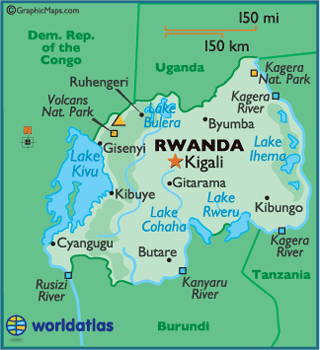KPFA/Ann Garrison” On Aug. 26, the BBC reported that Burundian officials are investigating to determine why an estimated 40 Rwandan bodies have been found floating in Lake Rweru, on Burundi’s border with Rwanda. Most of the bodies had been wrapped in plastic and many of the victims hands and feet were bound. Burundian officials said that the bodies must have come from Rwanda because they floated down the Akagera River into the lake.
Rwandan bodies have floated down the Kagera River into Lake Rwehu before, as cited In a situation report dated May 17, 1994, written by Mark Prutsalis of the NGO Refugees International. At the time, troops led by General, now President Paul Kagame were engaged in a fierce military offensive that ended two months later when they seized state power in Rwanda. As Kagame’s army advanced, Hutu refugees were fleeing across the Rwandan border into Tanzania at the rate of 3000 per day.
Peter Erlinder, a former International Criminal Tribunal on Rwanda defense lawyer, quoted the Prutsalis situation reports for KPFA:
Peter Erlinder: Let me quote from the Prutsalis Report to UNHCR. He said, “The RPF came and called for a ‘peace meeting.” Those who did not participate voluntarily were forced to the meeting. At the school people were tied together three by three—men/women/children—and stabbed. The bodies were put on trucks and thrown into the Kagera River, north of the Rusumo Bridge.”
These reports were received in areas that the RPF was occupying early in the war, and in the areas that they occupied in the eastern part of Rwanda. Now in addition to that. Prutsalis also wrote that ,“The RPF” – his quote now – “comes at five o’clock in the morning, waiting for villagers to open their doors. The villagers are caught and taken away to the river by trucks.
No one has ever returned. Refugees of the area have seen people being tied together and thrown into the river. It seems as if guns are only used if somebody tries to escape.”

Now these bodies floating in the Kagera River, many people will remember from the terrible visuals of the Rwandan Genocide, but those visions of the bodies floating in the river were said to be Tutsi bodies. We now know, because of these UNHCR reports that were made public during the Un trial, that those actually were Hutu bodies.
KPFA: Erlinder acknowledged that if the bodies are Rwandan, and if they are victims of state execution, it will be difficult to know whether they are Hutu or Tutsi, particularly because President Kagame is now arresting members of the Tutsi elite surrounding him.
Peter Erlinder: Well, that of course also is the problem. When a person is killed in Rwanda, it’s very difficult to to tell who is a Hutu and who is a Tutsi because the identification is very difficult to make. It’s easy to mistake one for the other. What we do know is that the people who were killed in 1994 were viewed as being opponents of the RPF military that was taking over that area and the people who are being killed today apparently are viewed as those who are opponents to the current government as well. But of course this is a mystery because it’s very difficult to find out what actually is going on in Rwanda because of the control of information coming from Rwanda. And that control of information itself is not secret. The control of information, I think, is acknowledged by most commentators.
KPFA: And that was former International Criminal Tribunal on Rwanda defense lawyer Peter Erlinder. Erlinder is the author of The Accidental Genocide, a narrated compendium of evidentiary documents which challenge the received history of the Rwandan Genocide. In Berkeley, for
Pacifica,
KPFA and
AfrobeatRadio, I’m Ann Garrison.


 Now these bodies floating in the Kagera River, many people will remember from the terrible visuals of the Rwandan Genocide, but those visions of the bodies floating in the river were said to be Tutsi bodies. We now know, because of these UNHCR reports that were made public during the Un trial, that those actually were Hutu bodies.
Now these bodies floating in the Kagera River, many people will remember from the terrible visuals of the Rwandan Genocide, but those visions of the bodies floating in the river were said to be Tutsi bodies. We now know, because of these UNHCR reports that were made public during the Un trial, that those actually were Hutu bodies.
